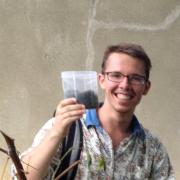 McCall Calvert
McCall Calvert
Who: McCall Calvert, Integrative Biology MS Candidate
What: 2019 Spring Graduate Student Seminar
When: Friday, April 30th at 11:00 AM
Where: SI 1086
Considerable evidence has recently accumulated suggesting that evolution is highly predictable. This is supported by studies that have found high repeatability in the degree and direction of phenotypic or genotypic change i) among population responding to similar selection pressures or ii) between laboratory experiments and variation in natural populations. The clearest examples often come in systems where well defined, directional selection operates on traits controlled by a handful of loci of major effect. Meanwhile, studies evaluating the predictability of genomic change where selection is operating on polygenic traits have yielded less consistent results. We show that a possible reason for this lack of predictability could be an incomplete knowledge of the multivariate trait combinations that respond to selection in a correlated manner. Past studies in the apple maggot fly Rhagoletis pomonella have observed a paradoxical relationship between genetic variation underpinning differentiation between host-associated populations and an important life history trait contributing to host adaptation, diapause termination. We find that variation in diapause termination is closely related to another life history trait putatively under selection, diapause intensity. A large proportion of genetic variants associated with both traits were clustered in a handful of genomic regions suggesting either pleiotropy or strong linkage disequilibrium. By comparing these results to previously collected genomic data in R. pomonella, we draw two main conclusions: 1) strong selection for diapause intensity in recently derived host-associated populations is dragging along ‘maladaptive’ variation in diapause termination and 2) historical, geographic selection in ancestral R. pomonella populations has shaped the available genetic variation in a direction antagonistic to favored trait combinations in the newly derived host-associated populations. The results of this research imply that incomplete knowledge on the multifarious selection pressures acting on a population can severely limit the ability to predict evolution. We follow up on these findings with deeper sequencing techniques to address their consistency and to ask whether the genomic basis of life history timing and population divergence is consistent across geography.
